
Considering a swimming pool for your backyard? Find out everything you need to know about in-ground pool costs, from materials to labor and more.
Pool construction and installation costs depend on your project and location. Check with a local pro for your specific job.
Gunite pools offer flexibility in design that is unmatched by other materials.
This material requires more frequent and costly maintenance than other common options.
As a high-end pool design choice, budget for landscaping and other design features to maximize your results.
Unless you have a perfectly flat, tree-free area, budget $200 to $6,000 per acre for land preps.
Gunite pools cost about $100,000 on average for a 14-by-28-foot pool, although costs may start at around $65,000 for a smaller pool with minimal land prep. But on the high end, gunite pools can reach over $120,000 for a large pool decked out with diving boards, slides, waterfalls, and other playful features. Expect to spend around $100 to $280 per square foot.
A gunite pool is an incredibly durable in-ground pool made of a steel rebar structure sprayed with a dry concrete mixture mixed with water and applied via a high-pressure nozzle. While gunite pools may cost more than other types of swimming pools, they are built to last a lifetime, so you can one day splash around with the grandkids in the same pool you and your children swam in.
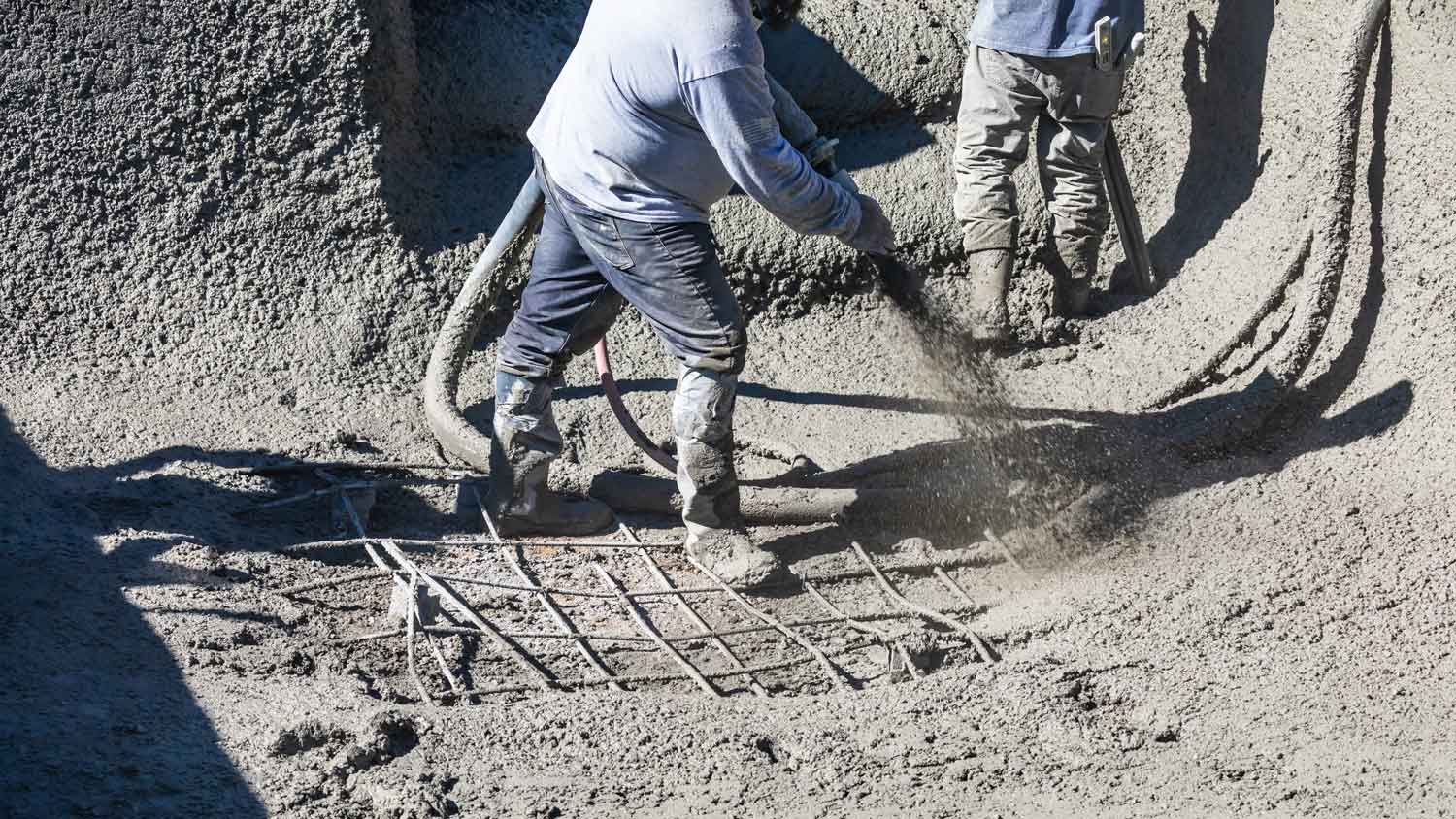
How much does a gunite pool cost? It depends on the pool. Gunite pool costs vary based on pool size, prep work, and add-ons. You may need significant prep to clear and excavate a perfectly sunny or shady spot in the yard for your pool, depending on your preferences. This all raises costs. Here’s how they break down.
| Gunite Pool Cost Factors | Average Cost |
|---|---|
| Size | $100–$280 per square foot |
| Materials | $60,000–$70,000 |
| Labor | $5,000–$30,000 |
| Excavation | $400–$1,500 |
| Permits | $450–$1,800 |
| Landscaping | $1,300–$6,050 |
The larger your pool, the more it costs. Gunite pools cost about $100 to $280 per square foot, and this material is usually used for larger pools around 14-by-28-feet. This is slightly higher than the cost of in-ground pools made from other materials—around $90 to $160 per square foot.
If you’re weighing concrete pools vs. fiberglass, fiberglass is always going to be one of the most cost-effective options. Gunite costs more to install and maintain, but you won’t have to replace it after 25 to 30 years.
The average cost of gunite pool materials is $60,000 to $70,000. Gunite is made from dry concrete mix and water that are mixed together with pressurized air just before the technicians spray the pool structure. The materials include the gunite as well as steel rebar to reinforce the pool structure and plumbing materials. After the gunite has cured, filling the pool with water costs about $60 to $1,250.
Labor makes up about one-third of the cost to install a gunite pool, but it is included in the average project total. That’s because installing a gunite pool must be done by a skilled professional. This project involves spraying the pool structure with a pressurized nozzle that mixes the gunite concrete mix and water as it pours.
| Professional Labor | Average Cost |
|---|---|
| General contractor | 10%–20% of total project costs |
| Pool contractor | $35–$75 per hour |
| Electrician | $50–$200 per hour |
| Excavation team | $40–$180 per hour |
| Plumber | $45–$200 per hour |
| Tile contractor | $30–$120 per hour |
| Mason or stoneworker | $50–$75 per hour |
| Fence installer | $25–$50 per hour |
Pool excavation costs about $500 to $4,500 for an in-ground gunite pool. If your backyard is full of trees or is hilly, you may spend another $200 to $6,000 per acre for land clearing, plus $0.50 to $2.30 per square foot to grade or level the yard area.
| Prep Job | Average Cost |
|---|---|
| Land excavation | $8–$25 per cubic yard |
| Land clearing | $200–$6,000 per acre |
| Grading and leveling | $0.50–$2.30 per square foot |
| Dirt removal or hauling | $8–$25 per cubic yard |
| Land survey | $400–$550 per survey |
| Equipment rental | $100–$200 per hour |
Different areas have different permit requirements. You’ll likely need at least a building permit to install any type of concrete pool. Permits typically cost $450 to $1,800. Your pool installer will handle the permitting process and will often include it in their initial quote.
For most homeowners, landscaping costs $1,300 to $6,050 on average, but it could cost more for extensive work or hardscaping. Excavation will dig up a significant portion of your yard—including some of the grass. For that reason, most homeowners landscape to finish off their pool area and give their yard a clean look. Even some grass does wonders, but you can also add grotto plants, decorative stones, or a patio.
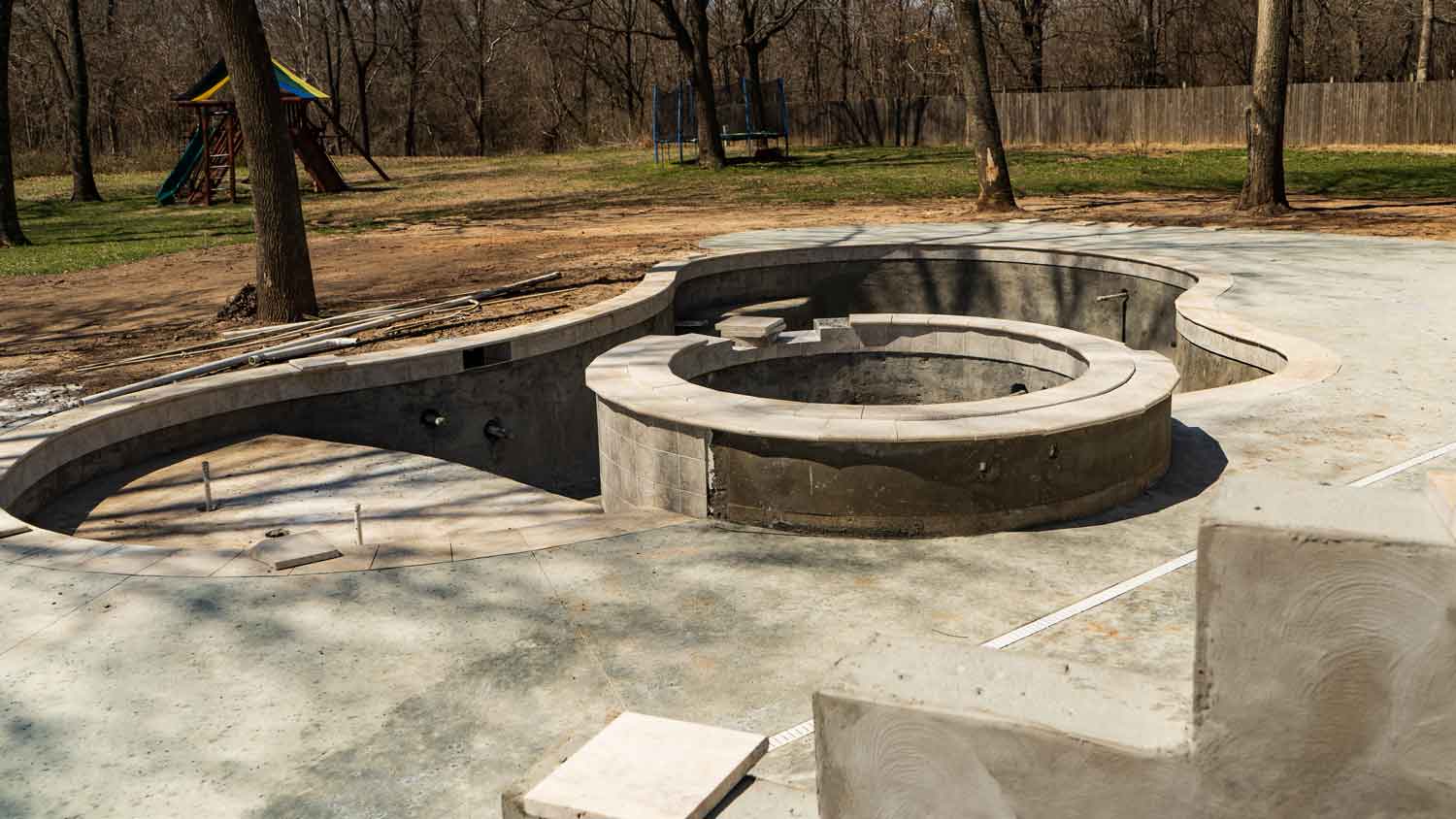
After the pool is installed, there are several costs that can come up. You’ll need to pay ongoing costs for operations and maintenance (or risk the pool water becoming green and unswimmable). Over time, you may also need to budget for repairs, such as filling small cracks or replastering the pool walls.
Homeowners will spend about $27,000 to $40,000 in the first 10 years after installing their gunite pool. You should budget about $2,700 to $4,000 per year in swimming pool maintenance costs.
While gunite pools are durable and long-lasting, they are pretty high maintenance. You’ll spend about $250 to $1,000 every four years to acid wash the pool, which will clear away mold and algae growing on the porous gunite walls. But all the acid washing means you’ll also need to replaster the pool every decade or so, and that adds another $10,000.
Owning and closing a pool comes with several responsibilities. You’ll need to skim or vacuum to clear out debris, check and clean the filters, test and balance the pH levels, and pay higher utility bills for the electricity running the pool lights, pumps, and filters. Pools can lose 2 inches of water per week, so you may need to add more water if the pool level looks low. Here’s a breakdown of operating costs to expect.
| Gunite Pool Service | Average Cost |
|---|---|
| Professional cleaning | $50–$100 per hour |
| DIY cleaning | $20–$150 per month |
| Closing a pool for winter | $150–$300 once per year |
| Opening a pool | $150–$400 once per year |
| Adding more water | $0.004 per gallon |
| Electricity | $300 per year |
Most swimming pool repairs cost between $240 and $1,100. Because of all the acid washing to keep the pool free and clear of algae and mold, gunite pools require replastering, which costs around $10,000, every 10 to 15 years. Gunite is a durable material, but if it does crack, it will cost about $75 per linear foot to repair the cracks.
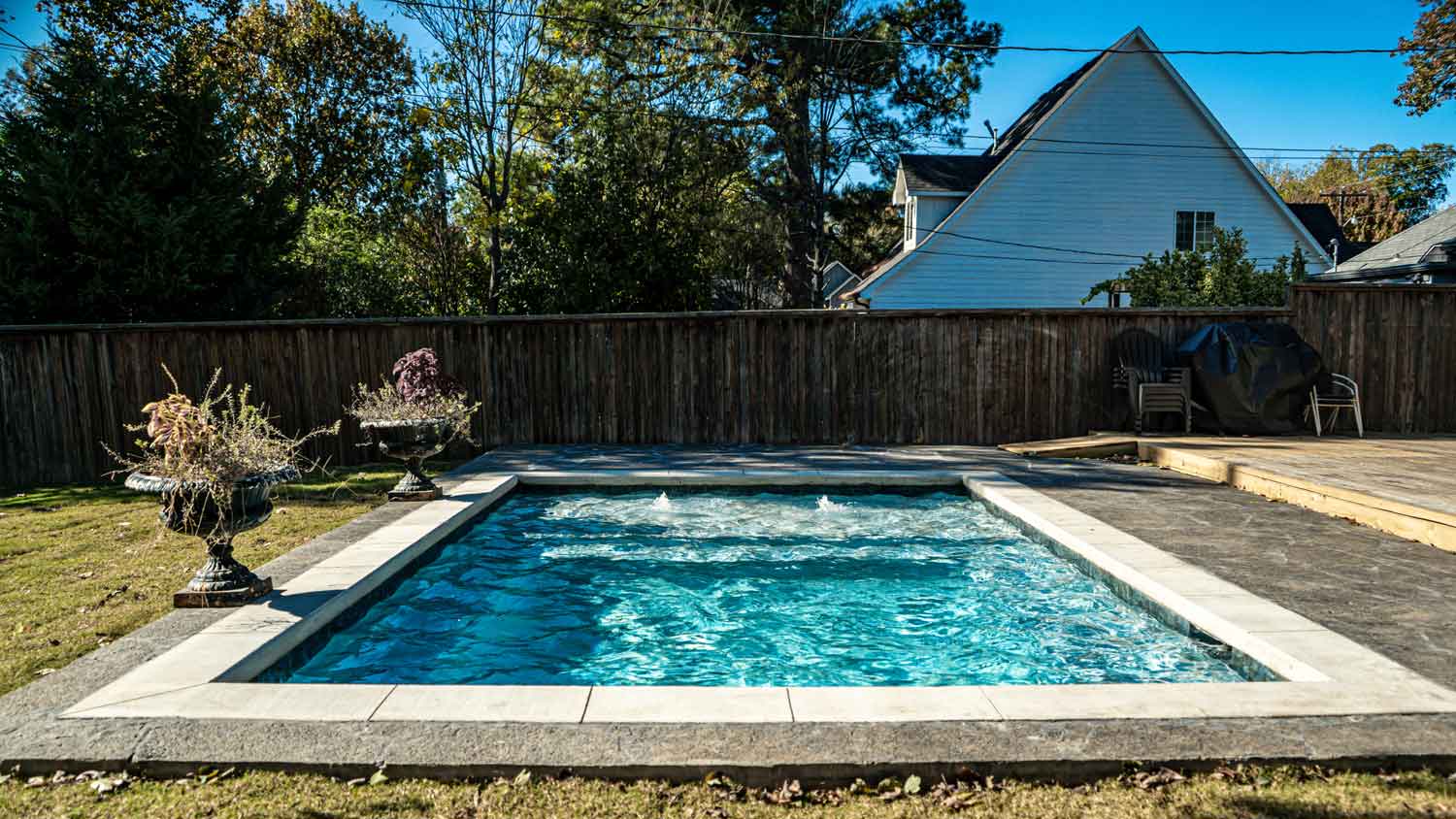
While you’re building the gunite pool, you may consider some fun features to make your pool more relaxing, recreational, or spa-like. From soothing waterfalls, to toasty hot tubs and retractable pool covers, there are endless ways to customize your gunite pool.
In-ground hot tub cost: $8,000–$25,000
Pool house cost: $26,600–$180,000
Waterfalls: $1,500–$5,000
Pool covers: $75–$22,000
Diving boards: $300–$5,000
Slides: $1,500–$5,000
Ladders: $150–$400 each
Pool lighting: $200–$625 per light
Pool heater cost: $1,775–$4,030
Pool deck cost: $3,000–$12,000
In-ground swimming pools, especially gunite pools, can be a high-cost investment. Because gunite has to be applied by an in-ground swimming pool installer near you, you can’t attempt to DIY to save some cash. Fortunately, there are still other ways to cut down the cost of your new swimming pool.
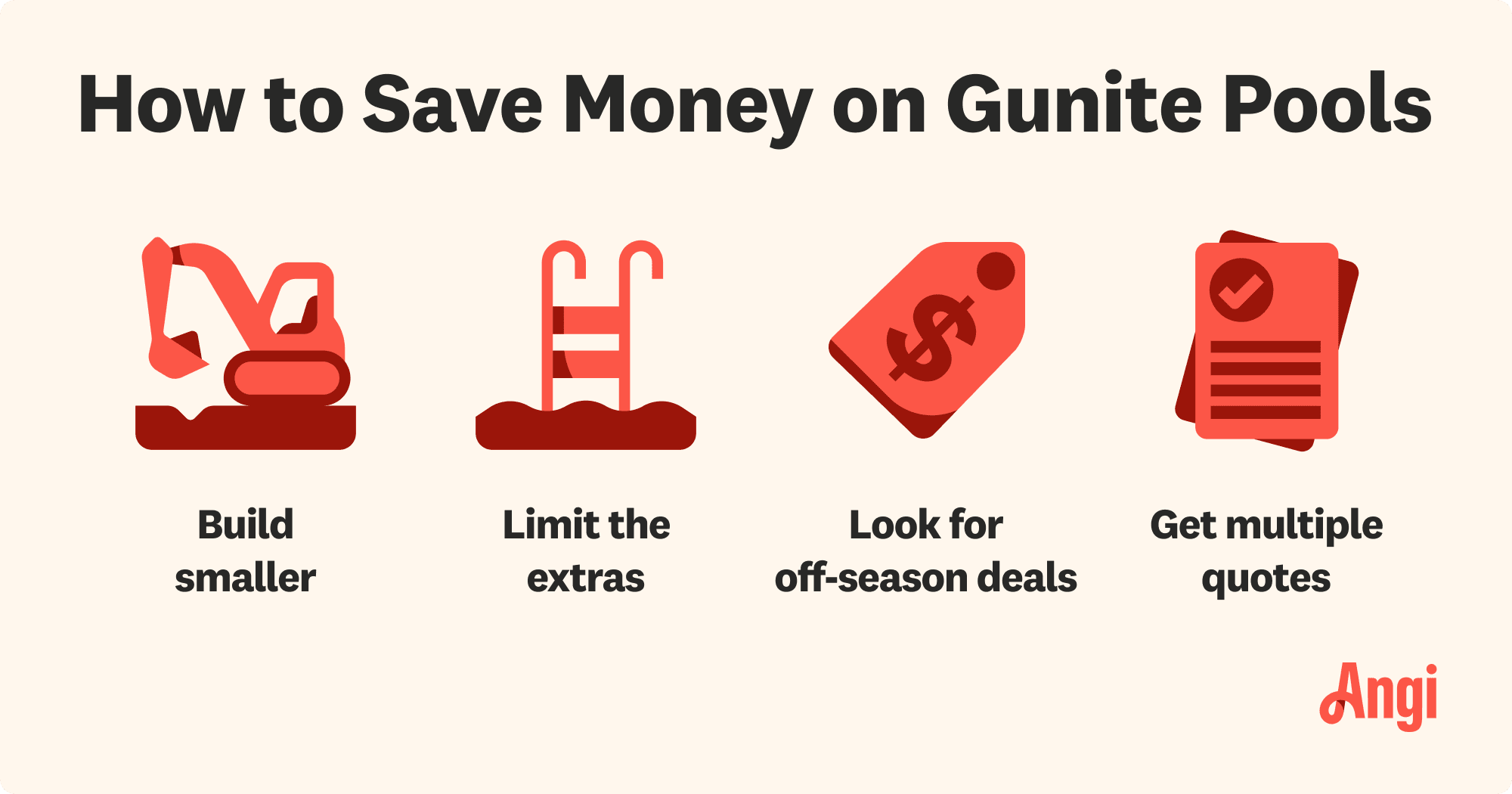
In-ground swimming pools, especially gunite pools, can be a high-cost investment. Because gunite has to be applied by an in-ground swimming pool installer near you, you can’t attempt to DIY to save some cash. Fortunately, there are still other ways to cut down the cost of your new swimming pool.
The smaller the pool’s footprint, the lower the project total will be. Unless you want an Olympic-sized pool to swim laps in, you can save money by opting for a smaller pool that still has plenty of room to float in.
Will you really use that diving board? Do you need the waterfall feature at the end of the pool? Some add-ons can cost thousands of dollars each, which really adds up. You can always wait a few years and save up for some of these extra features rather than paying for them while paying for the gunite pool installation.
Not only will some gunite pool builders offer discounts when you shop outside of peak season, but you can also whittle down costs on other items, like pool ladders and lighting, by buying in the off-season.
It’s always best to get at least three quotes from potential builders. This approach will help you find the best value. Don’t jump at the lowest quote, though—make sure to do your due diligence in checking the builders’ portfolio, reviews, and testimonials to find a company that will build you a high-quality gunite pool at a fair cost.
While it’s possible to DIY pool cleaning and maintenance, in-ground pool installation requires an entirely different set of skills and tools. Unless you are a pool installer yourself, you don’t have the ability, the tools, or the time to do the job. This is a fair assumption for any type of in-ground pool, but it’s especially true for a gunite pool, which has a complex installation that requires the expertise of a gunite pool installer near you.
It’s one thing to handle the cleaning and ongoing maintenance of a gunite pool as a DIYer, but pool installation should definitely be left to an experienced in-ground pool installer.
Only the pros have the tools and expertise to complete construction.
A poorly installed gunite pool can lower the value of a property due to safety and maintenance issues.
Pros are experienced with obtaining the necessary permits and complying with the local building code.
A gunite pool is built to last, but only if it is installed by an experienced pro and backed by workmanship and material warranties.
Review your property’s design, condition, and soil type to confirm whether a gunite in-ground pool can safely be installed.
Talk about what size, shape, and features you’d like for your new pool—and whether they can be achieved on your budget.
Ask about construction timelines, including permits and inspections, so that you can avoid delays and other issues when possible.
Learn about the ongoing maintenance needed to protect your investment over the years.
Home is the most important place on earth, which is why Angi has helped more than 150 million homeowners transform their houses into homes they adore. To help homeowners with their next project, Angi provides readers with the most accurate cost data and upholds strict editorial standards. We extensively research project costs to develop the pricing data you see, so you can make the best decisions for you and your home. We rely on reputable sources, including the U.S. Bureau of Labor Statistics, academic journals, market studies, and interviews with industry experts—all to ensure our prices reflect real-world projects.
Want to help us improve our cost data? Send us a recent project quote to [email protected]. Quotes and personal information will not be shared publicly.
From average costs to expert advice, get all the answers you need to get your job done.

Considering a swimming pool for your backyard? Find out everything you need to know about in-ground pool costs, from materials to labor and more.
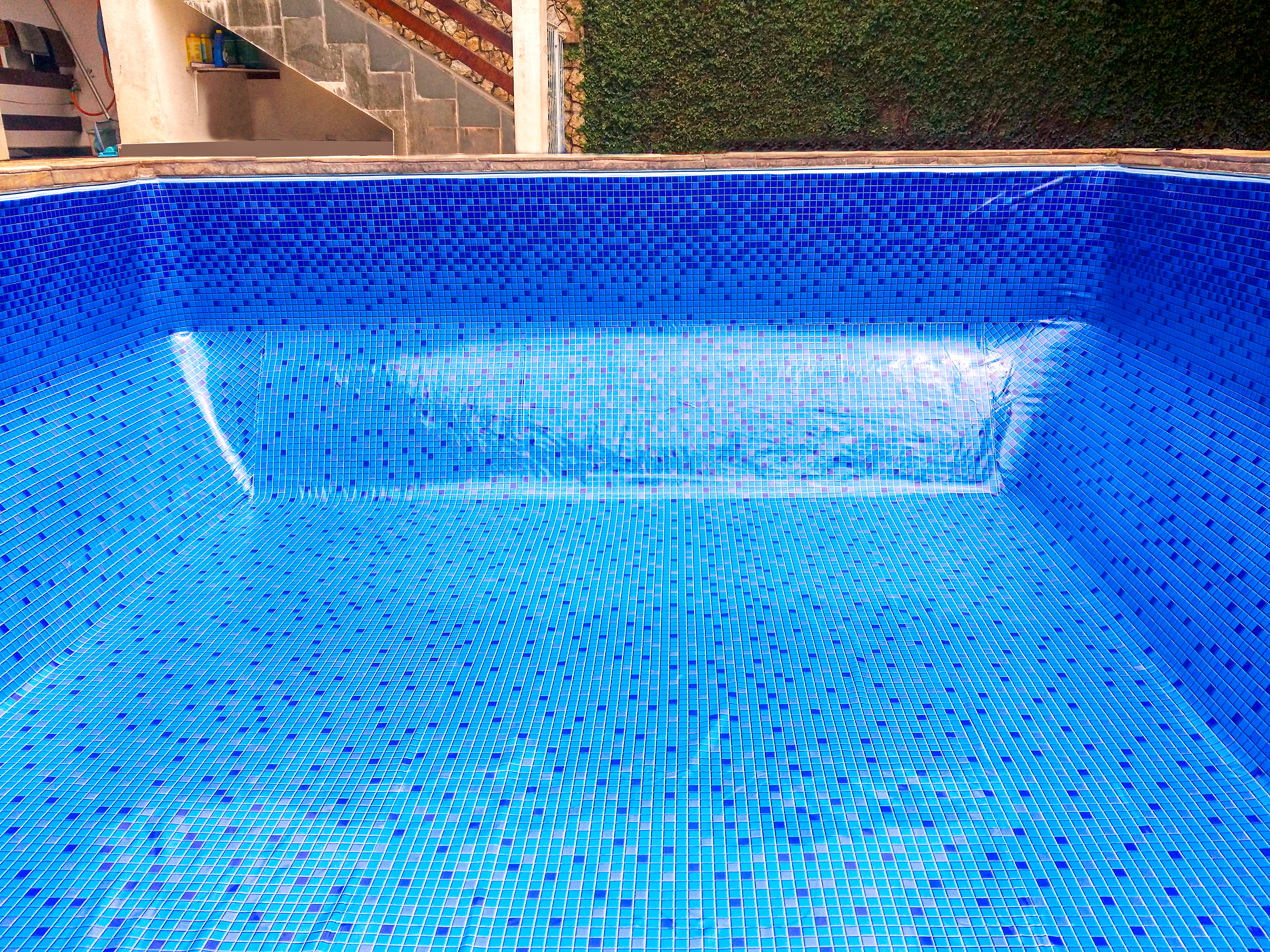
The cost of pool liner replacement in Columbus depends on the size and shape of your pool, as well as the liner material and type. Here’s how the costs break down.

If you’ve been considering installing a new pool in the Buckeye State, this guide will help you understand inground pool costs in Columbus.
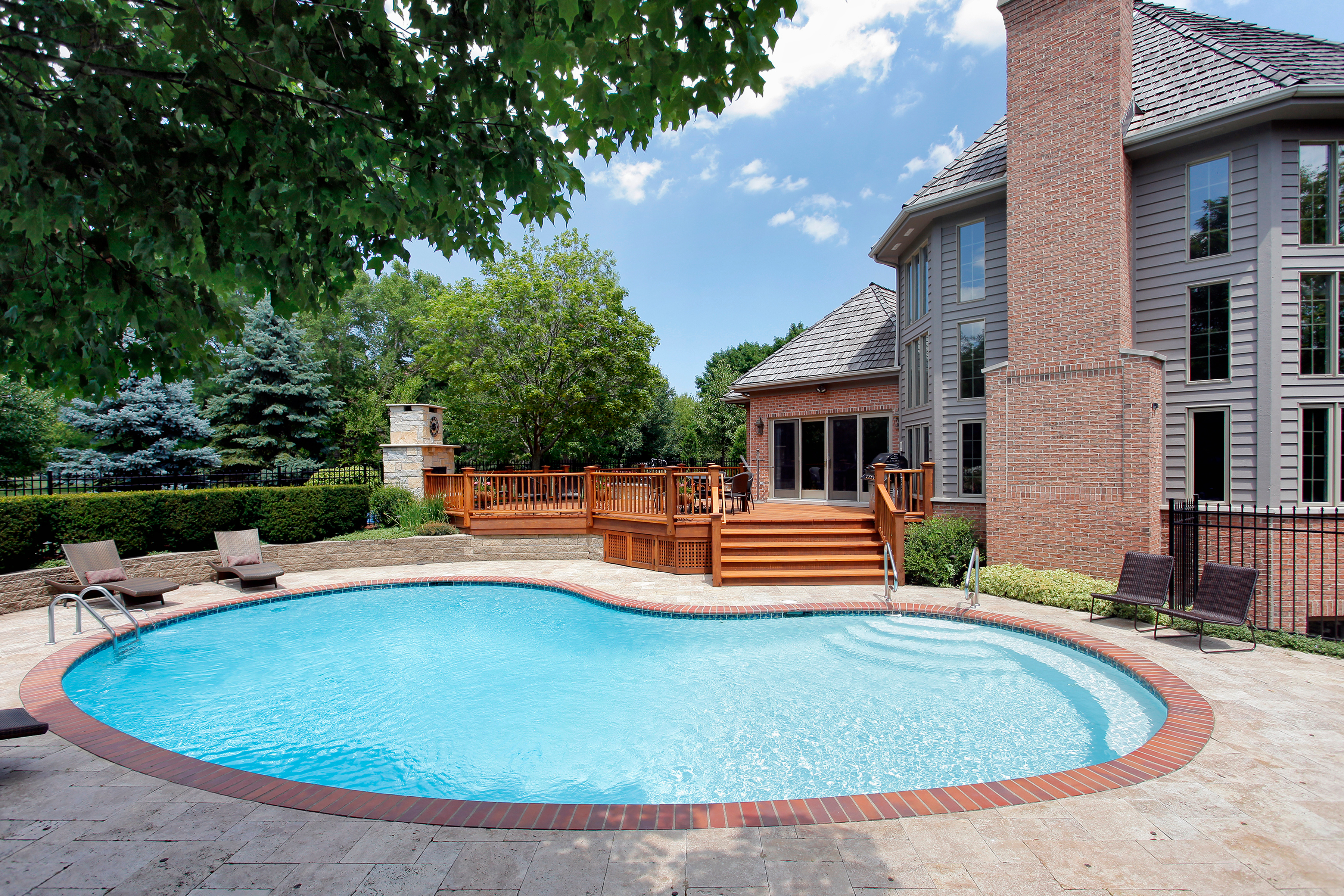
Installing a pool? Use this comprehensive pool inspection checklist before taking a plunge.
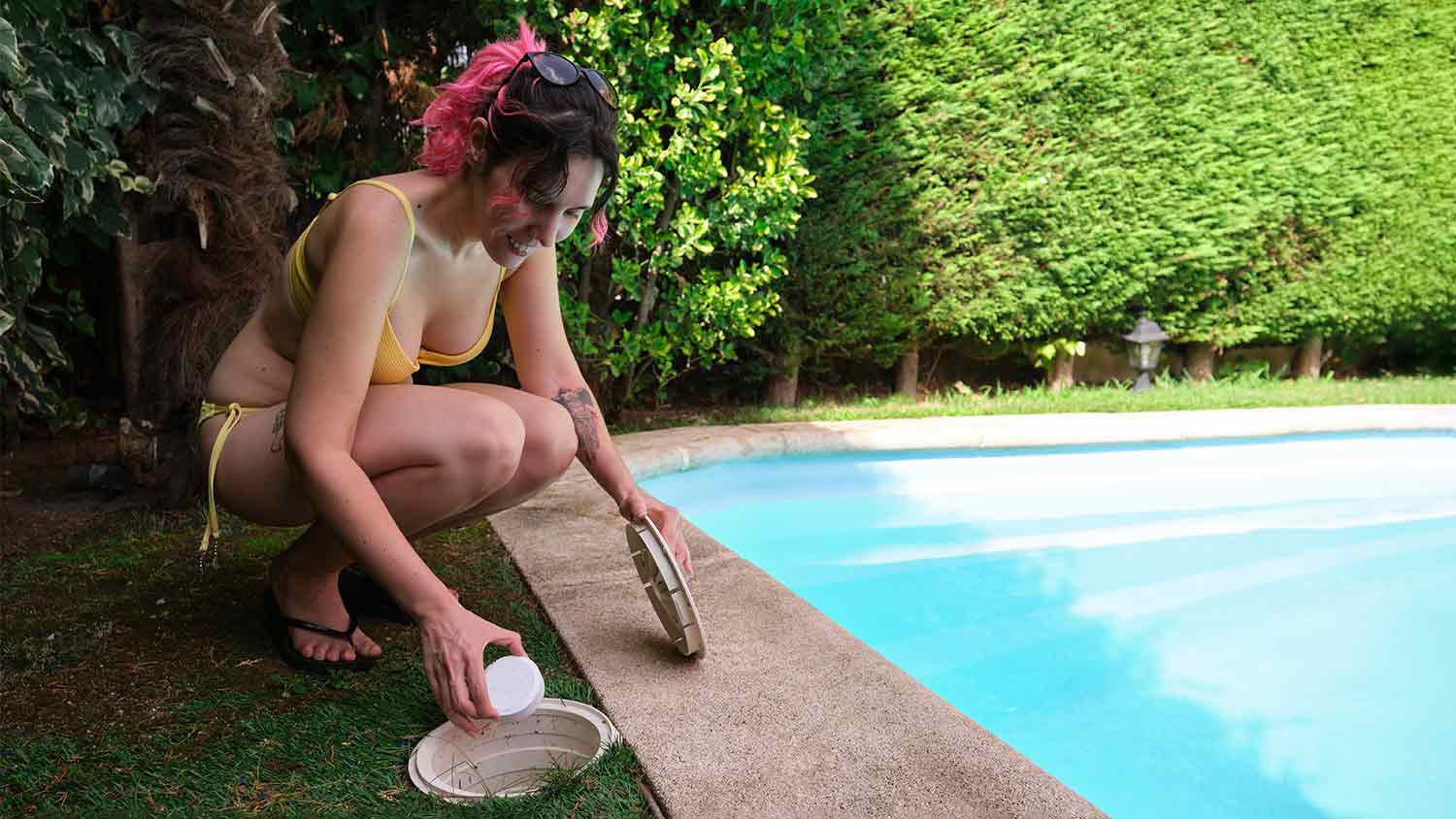
Our chlorine calculator helps you determine the exact amount of chlorine to add to your pool, based on its volume and your desired parts per million (ppm) level.

Swimming pools come in many sizes, but this pool size chart will simplify your choices and give you tips on how to choose the perfect size for your space.